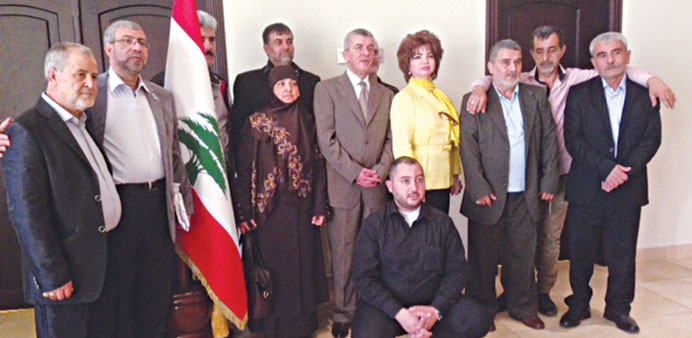The Lebanese delegation seen with ambassador Hassan Najm at the Lebanon embassy in Doha.
By Salman Siddiqui/Staff Reporter
They may be free after 17 months of captivity, but the horror of their ordeal continues to live on with them.
This was the testimony of a group of Lebanese men, who had been taken hostage in Syria in 2012, and released after Qatar’s successful intervention months later in October 2013.
The freed hostages came to Qatar earlier this week for the first time since their release to especially convey their gratitude to the Qatari leadership, including HH the Emir Sheikh Tamim bin Hamad al-Thani.
Jameel Saleh, 65, was one of the 11 Lebanese Shia pilgrims who had been kidnapped on their way back from Iran as they crossed over from the Turkish border into Syria in May, 2012.
“We were just civilians coming back from a religious pilgrimage, but our captors claimed that we worked for the Bashar al-Assad regime. They said they would kill us… I never thought I would make it back, I was sure they would kill me one day,” the frail-looking Saleh recalled. He still looked visibly shaken despite months passing since his release last October 2013.
“Not only us, but our families suffered gravely too. One day, our captors released a video of an area bombed by Assad regime in Syria, saying this was the place where we were being kept and now our blood was on the hands of the Syrian government. Just imagine what our families must have gone through,” he said.
Saleh said that since his release he has undergone a major heart surgery and had to take a large number of pills everyday.
He thanked god for uniting him with his family again and expressed his well wishes for the Qatari leadership.
When asked whether he would go on a pilgrimage again, he smiled and said: “By road? Never. But maybe I will go on an airplane.”
Awal Ibrahim, 47, was held for five months and was one of the first hostages to be released. He spoke of the harsh conditions they lived in that made many of them sick. “I had become so ill that the captors thought I would die soon, so they decided to release me first,” he said.
Ibrahim, who has three children and an ailing mother back home, said: “I feel like I’ve been born again.” He too thanked HH the Emir.
Dr Ali Akil Khalil, International Human Rights Commission’s Ambassador At Large for Middle East, appreciated the ‘very positive’ role played by Qatar for the release of the hostages. He added that Qatar’s co-operation had not ended.
He said that despite the fact that the hostages were Shia pilgrims, Qatar helped when asked. “Qatar demonstrated that they help people purely on humanitarian grounds,” he said.
Khalil said that HH the Emir also spoke about the importance of peaceful coexistence of people from all faiths in the region in their meeting, which was very encouraging.
The IHRC official also said that currently there were two more Lebanese hostages in Syria, one of whom was a journalist associated with the Sky News network.
He lamented the fact that today there are many groups operating in the Syrian war theatre and it was becoming increasingly difficult for them to negotiate for the release of hostages, including some from Iran, UK, and the US.
He said that the other day, he got a call from a Chechen-origin rebel group that was now fighting in Syria, who said they would release hostages only if Russia released their men there.
“I don’t think there is anything called the Free Syrian Army anymore in Syria. There are so many groups there and now all of them are fighting each other,” he said.
Dr Rehab Bitar, human rights campaigner, who had accompanied the delegation, said that the ordeal of the freed hostages had practically not ended yet. She said that when the Lebanese men returned home, they found out they had to ‘unfairly’ pay the accumulated electricity and other utility bill charges for the time they were held in captivity in Syria. She said that she was planning to fight their cases in courts to get the victims relief.

